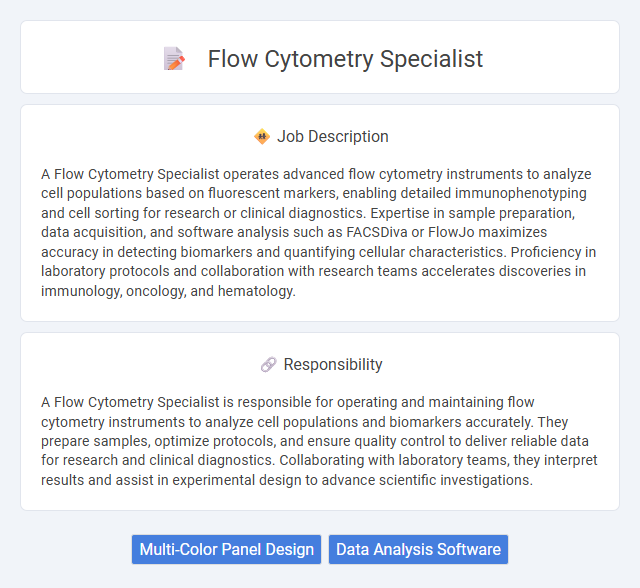
A Flow Cytometry Specialist operates advanced flow cytometry instruments to analyze cell populations based on fluorescent markers, enabling detailed immunophenotyping and cell sorting for research or clinical diagnostics. Expertise in sample preparation, data acquisition, and software analysis such as FACSDiva or FlowJo maximizes accuracy in detecting biomarkers and quantifying cellular characteristics. Proficiency in laboratory protocols and collaboration with research teams accelerates discoveries in immunology, oncology, and hematology.
Individuals with strong analytical skills and attention to detail are likely well-suited for a flow cytometry specialist role, as the job involves precise laboratory work and data interpretation. Those with a background in biology or biomedical sciences and a high tolerance for repetitive tasks may find this position particularly fitting. Candidates who thrive in controlled environments and possess good problem-solving abilities probably have a higher probability of success in this specialized field.
Qualification
Flow cytometry specialists require a strong foundation in immunology, cell biology, and advanced microscopy techniques, typically supported by a bachelor's or master's degree in biomedical sciences or related fields. Proficiency in operating flow cytometers, data analysis software such as FlowJo or FACSDiva, and expertise in sample preparation and instrumentation troubleshooting are essential qualifications. Certification from recognized organizations like the International Society for Advancement of Cytometry (ISAC) enhances credibility and demonstrates proficiency in standardized flow cytometry protocols.
Responsibility
A Flow Cytometry Specialist is responsible for operating and maintaining flow cytometry instruments to analyze cell populations and biomarkers accurately. They prepare samples, optimize protocols, and ensure quality control to deliver reliable data for research and clinical diagnostics. Collaborating with laboratory teams, they interpret results and assist in experimental design to advance scientific investigations.
Benefit
A Flow Cytometry Specialist likely gains the benefit of working with cutting-edge technology that enhances cell analysis precision and efficiency. This role may provide opportunities to contribute to advancements in medical research and diagnostics, increasing job satisfaction and professional growth. Access to collaborative environments in research institutions or biotech companies probably fosters continuous learning and skill development.
Challenge
A Flow Cytometry Specialist likely faces challenges in maintaining precision while analyzing complex cell populations due to the high sensitivity and variability of the equipment. Troubleshooting instrument malfunctions and ensuring accurate data interpretation could be frequent hurdles. There is also a probability of encountering difficulties in adapting protocols to new research requirements or emerging technologies.
Career Advancement
A Flow Cytometry Specialist plays a pivotal role in biomedical research and clinical diagnostics, mastering sophisticated cell analysis techniques that enable precise immune profiling and disease detection. Career advancement opportunities include progressing to senior scientist roles, leading specialized flow cytometry laboratories, or transitioning into clinical applications where expertise in cell sorting and multiparametric data analysis drives impactful patient outcomes. Continuous skill enhancement in emerging flow cytometry technologies, data management software, and regulatory compliance is essential for leadership positions and cross-disciplinary collaborations in pharmaceutical and academic research settings.
Key Terms
Multi-Color Panel Design
A Flow Cytometry Specialist with expertise in Multi-Color Panel Design excels in developing complex antibody panels to simultaneously analyze multiple cellular markers, enhancing the resolution and accuracy of immunophenotyping. Proficient in fluorochrome selection, spectral overlap compensation, and instrument calibration, they optimize assay performance for diverse applications such as cancer research, immunology, and stem cell analysis. Their skill set includes data interpretation using advanced software to ensure precise population gating and reproducible results in high-dimensional flow cytometric assays.
Data Analysis Software
Flow cytometry specialists utilize advanced data analysis software such as FlowJo, FCS Express, and Cytobank to interpret complex cellular data accurately. Proficiency in these tools enables specialists to perform multiparametric analysis, gating strategies, and generate high-resolution visualizations critical for immunophenotyping and cell sorting. Mastery of software algorithms and data normalization techniques directly improves experimental reproducibility and insights into cell population dynamics.
 kuljobs.com
kuljobs.com